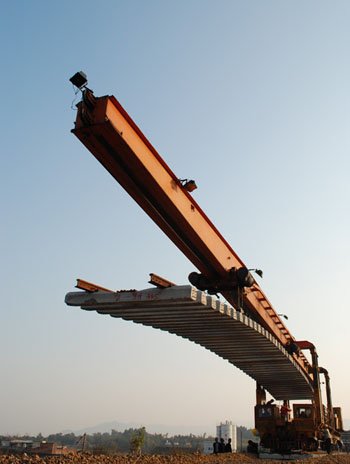Lessons on railway reorganization
- By John Ross
 0 Comment(s)
0 Comment(s) Print
Print E-mail china.org.cn, March 20, 2013
E-mail china.org.cn, March 20, 2013

China has announced reorganization of its railways. For most people from the UK this might lead to apprehensive shudders. Reorganization of Britain's railways led to successive disasters. First the system was privatized, which was followed by a catastrophic series of fatal rail crashes. Then the railway track and other infrastructure were renationalized. Infrastructure construction on the London Underground system was privatized, leading to losses of $2 billion, again followed by renationalization. Now 70 percent of the British population wants renationalization of the entire rail system. What lessons can be learnt by China on how to avoid such disasters?
This is still more important as China's railway development has much further to go. China has 98,000 kilometers of railway, but the U.S. has 228,500 kilometers. China has more than four times the U.S. population, meaning U.S. density of railway coverage per person is ten times China's. Anyone wanting to understand why the Chinese government rightly places so much emphasis of improving the country's logistics need only note that figure.
My involvement with railways was on the economic, not engineering, side. But experience taught the two are inseparably linked. In the Mayor of London's office I was in charge of negotiations for the construction of the $15 billion dollar cross London rail link Crossrail. So my views on these issues are based on practice not simply theory.
The fundamental economic fact about a railway is that it is necessarily an integrated monopoly – it is too expensive to build any significant number of competing rail lines. The reason for this inherent monopoly structure is the enormous investment cost of railway construction. These in turn mean that the finances of railway construction are central. The key question on railways is how to control a monopoly?
This immediately shows that the last thing required with railways is a "market solution" as the economics of a monopoly is simple: left to themselves monopolies always either over price or deliver low quality, or usually both!
The disasters in the UK railways were due to ignoring this reality. They overturned the fundamental rule that the legal form of an economic unit must correspond to its real productive nature or serious error will follow.
The first legal fiction in the UK railways was separating running trains from ownership of the track – which was supposed to create competition in infrastructure and train operation. Allegedly safety would be maintained by supervision of private companies carrying out the operations.
In practice such supervision cannot be detailed enough – railway infrastructure companies have thousands of employees carrying out millions of operations. The private rail infrastructure companies inevitably evaded supervision and attempted to increase profits by cost savings on work. The resulting low quality led to successive fatal rail crashes at Paddington in 1999, Hatfield in 2000, and Potters Bar in 2002. The only way to end this was to renationalize railway infrastructure – which was done. Since then there have been no similar fatal disasters.





